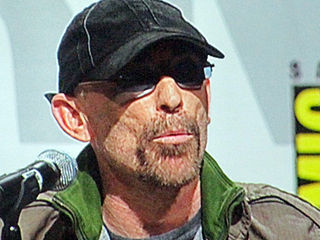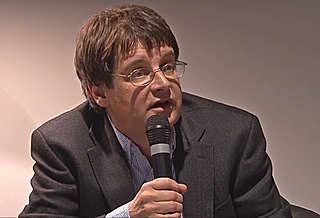A Quote by Immanuel Wallerstein
A second variety concentrated on presumed major transformations of the capitalist system as of some recent point in time, in which the whole earlier point of time served as a mythologized foil against which to treat the empirical reality of the present.
Related Quotes
The humans live in time but our Enemy destines them to eternity. He therefore, I believe, wants them to attend chiefly to two things, to eternity itself, and to that point of time which they call the Present. For the Present is the point at which time touches eternity. Of the present moment, and of it only, humans have an experience analogous to the experience which our Enemy has of reality of whole; in it alone freedom and actuality are offered to them.
When we hit a nail with a hammer, the whole of the shock received by the large head of the nail passes into the point without any of it being lost, although it is only a point. If the hammer and the head of the nail were infinitely big it would be just the same. The point of the nail would transmit this infinite shock at the point to which it was applied. Extreme affliction, which means physical pain, distress of soul and social degradation, all at the same time, constitutes the nail. The point is applied at the very center of the soul, whose head is all necessity, spreading throughout space and time.
In his (Christ's) surrender on the cross all the pain and agony of mankind was concentrated at a single point, and passed through from death to immortality, There is no pain of any creature from the beginning to the end of time which was not 'known' at this point and thus transmuted. To know all things in the Word is thus to know all the suffering of the world transfigured by the resurrection, somehow reconciled and atoned in eternal life. It was God's purpose which he set forth in Christ as a plan for the fullness of time, to unite all things in him, things on heaven and things on earth'.
But every point of view is a point of blindness: it incapacitates us for every other point of view. From a certain point of view, the room in which I write has no door. I turn around. Now I see the door, but the room has no window. I look up. From this point of view, the room has no floor. I look down; it has no ceiling. By avoiding particular points of view we are able to have an intuition of the whole. The ideal for a Christian is to become holy, a word which derives from “whole.
The whole of God is present at every point in space at the same time. Take time to meditate on this great idea. In other words, God doesn't come and go. God doesn't capriciously move substance from God's supply "up there" to fill your needs "down here." Nor does God answer prayer in some kind of coming forth. God is always present, totally present - as a Presence.
If you draw the entire timeline of humanity from the time humans first trod until today, let's just assume that's 10 feet on a timeline. My time on that timeline is so small that you couldn't point it out. Let's say it's smaller than a grain of sand, in that whole 10-foot timeline of humanity. And when I lost my hearing, it happened to coincide with human technology advancing to the point that the cochlear implant existed. If I had lost my hearing five years earlier, I would have had to quit my job. I would have lost my career. I've always been kind of in awe of that reality.
For me, it is clear that we are currently in a period of structural crisis of capitalism going back to the 1970s, but deepening in our time. Persistent economic stagnation together with neoliberal austerity has at this point seriously undermined the stability of the liberal-democratic state and thus the political command sector of the capitalist system. This has led to a dangerous resurgence of political movements in the fascist genus, representing an alternative way of managing the state of the capitalist system, opposed to liberal democracy.
I have to tell it again and again: I have no doctrine. I only point out something. I point out reality, I point out something in reality which has not or too little been seen. I take him who listens to me at his hand and lead him to the window. I push open the window and point outside. I have no doctrine, I carry on a dialogue.
We somehow believe that our point of view is superior, higher than those of the greatest minds either because our point of view is that of our time, and our time, being later than the time of the greatest minds, can be presumed to be superior to their times; or else because we believe that each the greatest minds was right from his point of view, but not, as he claims, simply right.





































